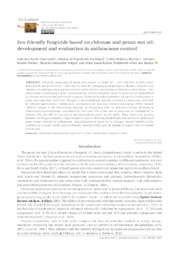Eco-friendly fungicide based on chitosan and pecan nut oil: development and evaluation in anthracnose control.
Eco-friendly fungicide based on chitosan and pecan nut oil: development and evaluation in anthracnose control.
Summary: Industrial processing of pecan nuts results in edible oil ? with fractions of fatty acids, polyphenols and phytosterols - that may be used for managing phytopathogens. Besides, chitosan may interfere with pathogen development directly and/or activate mechanisms of defense in plant tissues. This study aimed at developing a novel, natural and eco-friendly fungicide based on pecan nut oil immobilized in chitosan and at evaluating its activity against Colletotrichum gloeosporioides, an agent of anthracnose in guava trees and other fruit trees. Changes in the immobilized material exhibited at bands were identified by infrared spectroscopy. Additionally, micrographs by scanning electron microscopy (SEM) showed efficient changes in the immobilized material, by comparison with the polymer chitosan. Decreases in Colletotrichum gloeosporioides sporulation in vitro were 37% in the case of pecan nut oil immobilized in chitosan (IO) and 39% in the case of non-immobilized pecan nut oil (NIO). These results are positive because this fungus produces a large number of spores which may disseminate and survive on surfaces of plant tissues infected by anthracnose. Immobilization of pecan oil in chitosan showed benefits in the synthesis of a novel, stable and eco-friendly material which may be applied to guava trees to control anthracnose.
Publication year: 2023
Types of publication: Journal article
Keywords: Fungicida, Fungicides, Noz Peca, Pecans, Óleo
Observation
Some of Embrapa's publications are published as ePub files. To read them, use or download one of the following free software options to your computer or mobile device. Android: Google Play Books; IOS: iBooks; Windows and Linux: Calibre.
Access other publications
Access the Agricultural Research Database (BDPA) to consult Embrapa's full library collection and records.
Visit Embrapa Bookstore to purchase books and other publications sold by Embrapa.

